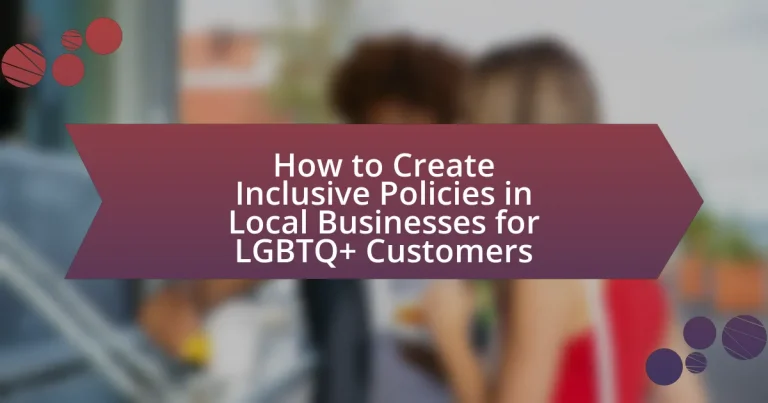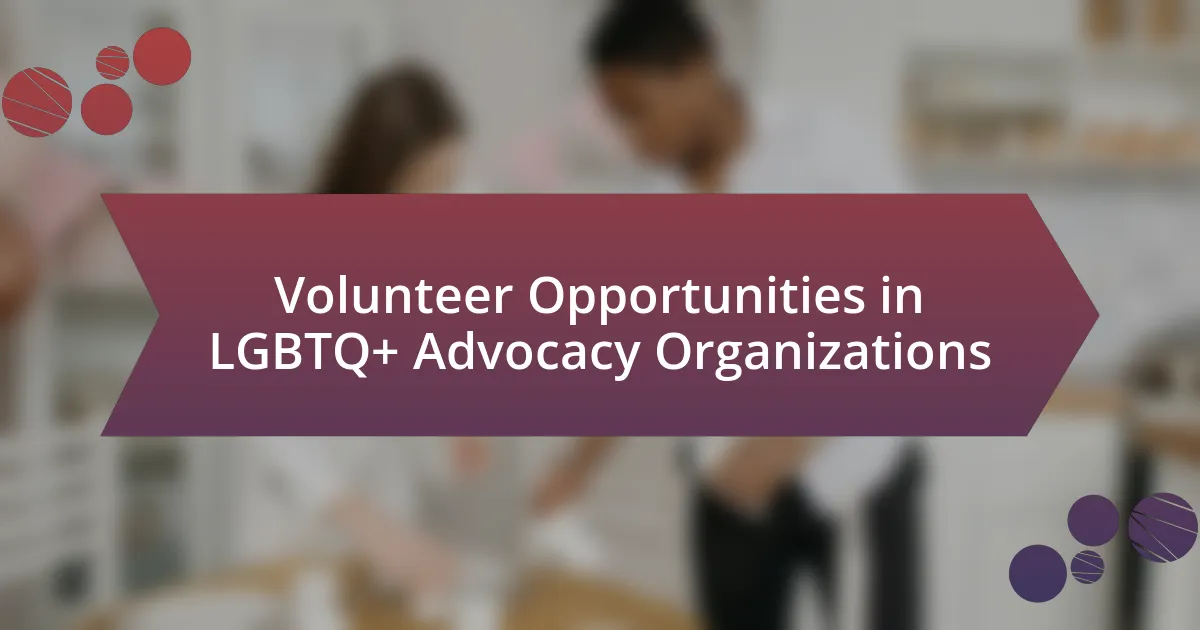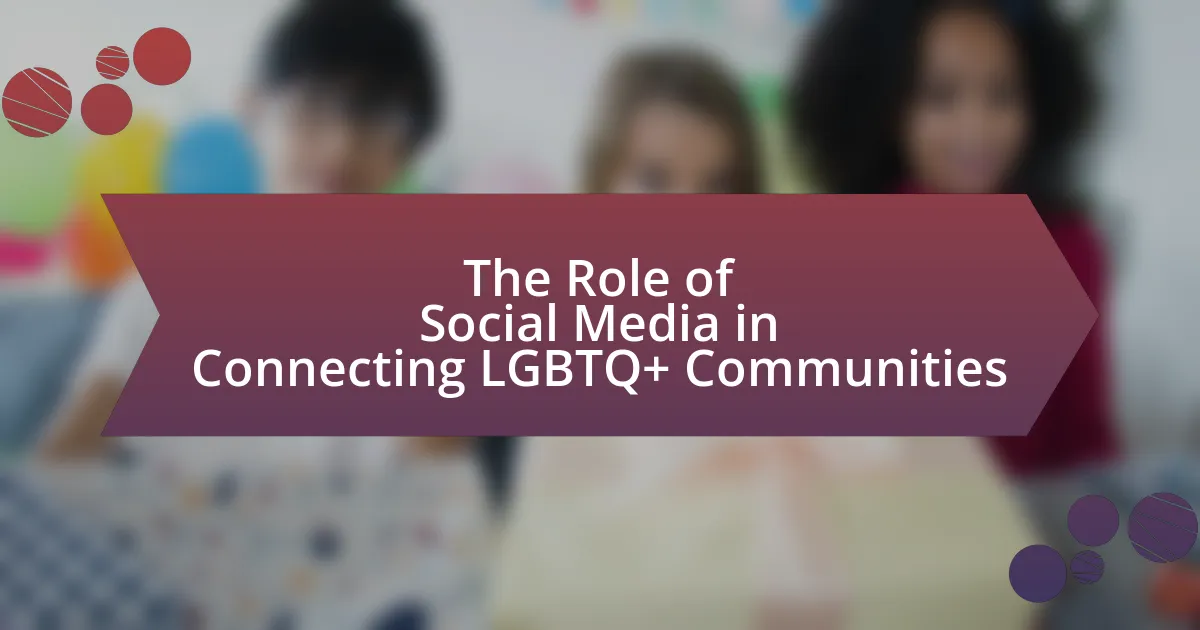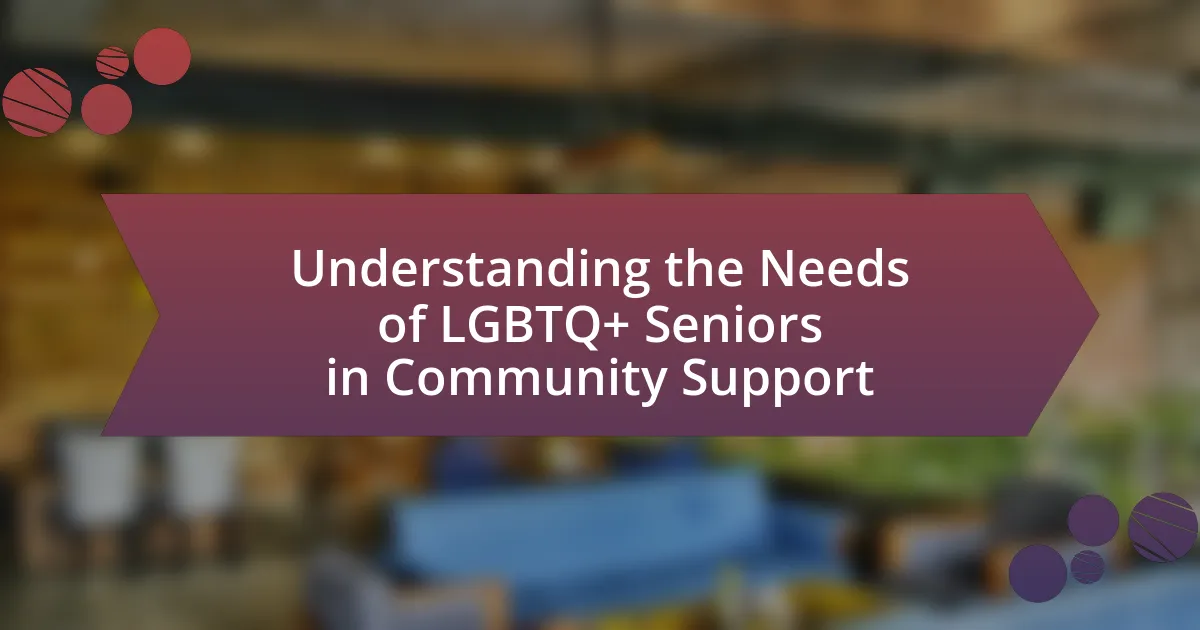The article focuses on the development of inclusive policies in local businesses aimed at supporting LGBTQ+ customers. It outlines the importance of such policies, including non-discrimination clauses, equitable access to services, and staff training on LGBTQ+ issues, which foster a welcoming environment and enhance customer loyalty. The article also discusses the impact of inclusive policies on community reputation, the challenges businesses may face in implementation, and best practices for engaging with the LGBTQ+ community. Additionally, it emphasizes the significance of ongoing training and effective marketing in promoting inclusivity, ultimately benefiting both customer satisfaction and business performance.

What are Inclusive Policies for LGBTQ+ Customers in Local Businesses?
Inclusive policies for LGBTQ+ customers in local businesses are guidelines and practices designed to create a welcoming and supportive environment for individuals of diverse sexual orientations and gender identities. These policies often include non-discrimination clauses that explicitly protect LGBTQ+ individuals from bias in service, hiring, and treatment. For example, a 2020 report by the Human Rights Campaign found that 46% of LGBTQ+ Americans experienced discrimination in public accommodations, highlighting the need for businesses to adopt clear policies that affirm their commitment to inclusivity. Additionally, training staff on LGBTQ+ issues and using inclusive language in marketing materials further reinforces a business’s dedication to serving all customers equitably.
Why are Inclusive Policies Important for LGBTQ+ Customers?
Inclusive policies are important for LGBTQ+ customers because they foster a safe and welcoming environment, which enhances customer loyalty and satisfaction. Research indicates that 70% of LGBTQ+ consumers are more likely to support businesses that demonstrate inclusivity through policies and practices. Furthermore, inclusive policies can lead to increased market share, as the LGBTQ+ community has significant purchasing power, estimated at over $1 trillion in the United States alone. By implementing inclusive policies, businesses not only comply with anti-discrimination laws but also position themselves as leaders in social responsibility, ultimately benefiting their brand reputation and financial performance.
How do inclusive policies impact customer loyalty?
Inclusive policies significantly enhance customer loyalty by fostering a sense of belonging and trust among diverse customer groups. When businesses implement inclusive policies, such as non-discrimination practices and representation of LGBTQ+ individuals, they demonstrate commitment to equality and respect, which resonates with customers. Research indicates that 70% of LGBTQ+ consumers are more likely to support brands that actively promote inclusivity and diversity (source: Community Marketing & Insights, 2021). This alignment with customer values leads to increased brand loyalty, repeat business, and positive word-of-mouth referrals, ultimately benefiting the business’s bottom line.
What role do inclusive policies play in community reputation?
Inclusive policies significantly enhance community reputation by fostering a sense of belonging and acceptance among diverse groups. When local businesses implement inclusive policies, they demonstrate a commitment to equality and respect, which can attract a broader customer base and improve community relations. Research indicates that businesses perceived as inclusive are more likely to receive positive word-of-mouth referrals and customer loyalty, as seen in a study by the Human Rights Campaign, which found that 72% of LGBTQ+ consumers are more likely to support brands that actively promote inclusivity. Thus, inclusive policies not only strengthen community ties but also contribute to a positive public image for businesses.
What Elements Constitute Inclusive Policies?
Inclusive policies are constituted by elements such as non-discrimination clauses, equitable access to services, representation in decision-making, and sensitivity training for staff. Non-discrimination clauses explicitly prohibit bias based on sexual orientation and gender identity, ensuring that LGBTQ+ individuals are treated fairly. Equitable access to services guarantees that all customers, regardless of their identity, can utilize facilities and resources without barriers. Representation in decision-making involves including LGBTQ+ voices in policy formulation, which fosters a more comprehensive understanding of community needs. Sensitivity training for staff equips employees with the knowledge and skills to interact respectfully and supportively with LGBTQ+ customers, enhancing the overall inclusivity of the business environment.
What specific practices should be included in these policies?
Inclusive policies for local businesses serving LGBTQ+ customers should include practices such as non-discrimination clauses, gender-neutral restrooms, and staff training on LGBTQ+ issues. Non-discrimination clauses ensure that all customers are treated equally regardless of sexual orientation or gender identity, which is supported by the Equality Act 2010 in the UK, prohibiting discrimination based on these characteristics. Gender-neutral restrooms provide safe and accessible facilities for all customers, aligning with best practices recommended by organizations like the Human Rights Campaign. Staff training on LGBTQ+ issues fosters a welcoming environment, as studies show that informed staff can significantly enhance customer experiences and satisfaction.
How can businesses ensure their policies are comprehensive?
Businesses can ensure their policies are comprehensive by conducting thorough assessments of existing policies and engaging diverse stakeholders in the policy development process. This approach allows businesses to identify gaps and incorporate a wide range of perspectives, particularly from LGBTQ+ communities, ensuring that policies address specific needs and concerns. Research indicates that inclusive policies not only enhance customer satisfaction but also improve employee morale and retention, as seen in a study by the Human Rights Campaign, which found that 90% of LGBTQ+ employees reported feeling more engaged in inclusive workplaces.
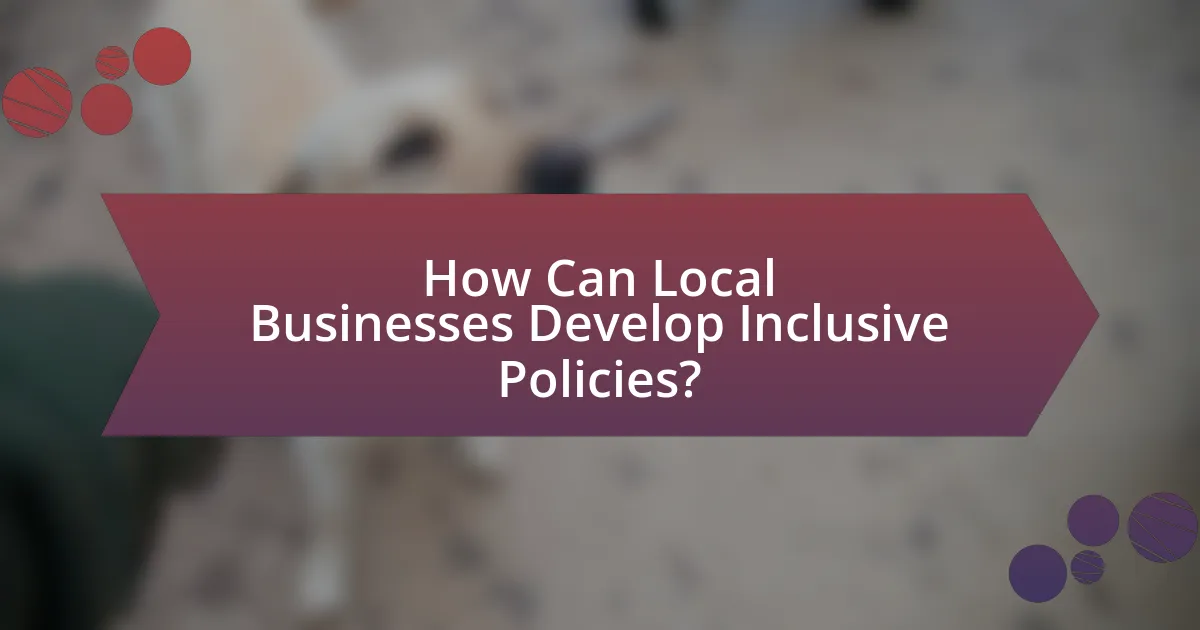
How Can Local Businesses Develop Inclusive Policies?
Local businesses can develop inclusive policies by actively engaging with LGBTQ+ communities and incorporating their feedback into policy formation. This approach ensures that the policies reflect the needs and concerns of diverse customers. For instance, conducting surveys or focus groups with LGBTQ+ individuals can provide valuable insights into their experiences and expectations. Additionally, implementing training programs for staff on LGBTQ+ issues fosters a welcoming environment, as evidenced by studies showing that businesses with trained employees report higher customer satisfaction among LGBTQ+ patrons. Furthermore, establishing clear anti-discrimination policies and promoting them publicly can enhance trust and loyalty within the community.
What Steps Should Businesses Take to Create Inclusive Policies?
Businesses should conduct a comprehensive assessment of their current policies and practices to create inclusive policies for LGBTQ+ customers. This involves gathering feedback from LGBTQ+ community members and employees to identify gaps and areas for improvement. Implementing training programs on diversity and inclusion for all staff is essential, as it fosters a welcoming environment. Additionally, businesses should establish clear anti-discrimination policies that explicitly include sexual orientation and gender identity, ensuring compliance with local and national laws. Regularly reviewing and updating these policies based on community feedback and changing legal standards will further enhance inclusivity. According to a 2021 report by the Human Rights Campaign, inclusive policies not only improve customer satisfaction but also enhance employee morale and retention, demonstrating the tangible benefits of such initiatives.
How can businesses assess their current policies?
Businesses can assess their current policies by conducting a comprehensive review that includes stakeholder feedback, policy audits, and benchmarking against best practices in inclusivity. This process involves gathering input from employees, customers, and community members to identify gaps and areas for improvement. Additionally, analyzing existing policies against established frameworks, such as the Human Rights Campaign’s Corporate Equality Index, provides a concrete standard for evaluation. This method ensures that businesses not only understand their current standing but also align their policies with recognized inclusivity benchmarks, thereby enhancing their commitment to LGBTQ+ inclusivity.
What resources are available for developing inclusive policies?
Resources available for developing inclusive policies include guidelines from organizations such as the Human Rights Campaign, which provides a comprehensive toolkit for businesses to create LGBTQ+ inclusive environments. Additionally, the Williams Institute offers research and data on LGBTQ+ demographics and needs, which can inform policy development. The National LGBTQ Task Force also provides resources and training programs aimed at fostering inclusivity in various sectors. These organizations supply evidence-based practices and frameworks that help businesses implement effective inclusive policies.
How Can Businesses Engage with the LGBTQ+ Community?
Businesses can engage with the LGBTQ+ community by implementing inclusive policies, actively participating in LGBTQ+ events, and fostering a supportive workplace culture. Inclusive policies, such as non-discrimination clauses and gender-neutral facilities, demonstrate commitment to equality and respect for all individuals. Participation in events like Pride parades and LGBTQ+ community fundraisers not only shows support but also helps build relationships with community members. Additionally, creating a workplace culture that values diversity and inclusion can enhance employee morale and attract a broader customer base, as studies indicate that 70% of LGBTQ+ consumers prefer to support brands that are openly supportive of their rights.
What methods can be used to gather feedback from LGBTQ+ customers?
Surveys and focus groups are effective methods to gather feedback from LGBTQ+ customers. Surveys can be distributed online or in-store, allowing customers to provide anonymous feedback on their experiences and perceptions of inclusivity. Focus groups facilitate in-depth discussions, enabling businesses to understand the specific needs and concerns of LGBTQ+ individuals. Research indicates that 70% of LGBTQ+ consumers feel more loyal to brands that actively seek their feedback, highlighting the importance of these methods in fostering a supportive environment.
How can partnerships with LGBTQ+ organizations enhance policy development?
Partnerships with LGBTQ+ organizations can enhance policy development by providing expert insights and lived experiences that inform more inclusive and effective policies. These organizations often have a deep understanding of the challenges faced by LGBTQ+ individuals, which can guide businesses in creating policies that address specific needs and promote equality. For instance, research from the Human Rights Campaign indicates that companies with inclusive policies see improved employee satisfaction and retention, demonstrating the tangible benefits of such partnerships. By collaborating with LGBTQ+ organizations, businesses can ensure their policies are not only compliant with legal standards but also genuinely supportive of LGBTQ+ communities, leading to a more inclusive environment.

What Challenges Might Businesses Face in Implementing Inclusive Policies?
Businesses may face several challenges in implementing inclusive policies, including resistance from employees, lack of understanding of LGBTQ+ issues, and insufficient training resources. Resistance from employees can stem from personal biases or a lack of awareness about the importance of inclusivity, which can hinder the adoption of new policies. Additionally, many businesses may struggle with a lack of understanding regarding the specific needs and rights of LGBTQ+ individuals, leading to ineffective or poorly designed policies. Insufficient training resources can further complicate the implementation process, as employees may not receive the necessary education to foster an inclusive environment. According to a 2020 report by the Human Rights Campaign, 46% of LGBTQ+ employees reported experiencing discrimination in the workplace, highlighting the critical need for effective inclusive policies and the challenges businesses face in addressing these issues.
What Common Obstacles Do Businesses Encounter?
Businesses commonly encounter obstacles such as lack of awareness, resistance to change, and insufficient training when creating inclusive policies for LGBTQ+ customers. Lack of awareness often stems from a limited understanding of LGBTQ+ issues, which can hinder the development of effective policies. Resistance to change is frequently observed among employees and management who may be uncomfortable with new practices or policies. Insufficient training can lead to misunderstandings and inadequate implementation of inclusive measures, ultimately affecting customer experience and business reputation. According to a 2020 report by the Human Rights Campaign, 46% of LGBTQ+ individuals have experienced discrimination in public accommodations, highlighting the critical need for businesses to address these obstacles to foster inclusivity.
How can businesses address resistance from employees or customers?
Businesses can address resistance from employees or customers by implementing open communication channels and providing education on inclusivity. Open dialogue allows employees and customers to express their concerns and feel heard, which can reduce resistance. Additionally, educational programs that focus on the importance of inclusivity, particularly regarding LGBTQ+ issues, can foster understanding and acceptance. Research shows that organizations with inclusive policies experience higher employee satisfaction and customer loyalty, as seen in a study by the Human Rights Campaign, which found that 72% of LGBTQ+ employees reported better job performance in inclusive workplaces.
What legal considerations should businesses be aware of?
Businesses should be aware of anti-discrimination laws that protect LGBTQ+ individuals in the workplace and in service provision. These laws, such as the Civil Rights Act and various state-level statutes, prohibit discrimination based on sexual orientation and gender identity. For instance, the U.S. Supreme Court’s decision in Bostock v. Clayton County (2020) confirmed that Title VII of the Civil Rights Act protects employees from discrimination based on sexual orientation and gender identity. Additionally, businesses must ensure compliance with local ordinances that may provide further protections for LGBTQ+ individuals, as these can vary significantly by jurisdiction. Understanding these legal frameworks is essential for creating inclusive policies that not only comply with the law but also foster a welcoming environment for LGBTQ+ customers.
How Can Businesses Measure the Effectiveness of Their Policies?
Businesses can measure the effectiveness of their policies by utilizing quantitative and qualitative metrics, such as employee surveys, customer feedback, and performance data. For instance, conducting regular employee surveys can reveal perceptions of inclusivity and identify areas for improvement, while analyzing customer feedback can provide insights into the experiences of LGBTQ+ customers. Additionally, tracking key performance indicators (KPIs) related to employee retention, customer satisfaction, and sales growth can help assess the impact of inclusive policies. Research from the Human Rights Campaign indicates that companies with inclusive policies experience higher employee engagement and retention rates, further validating the importance of measuring policy effectiveness.
What metrics can be used to evaluate inclusivity in customer experiences?
Metrics that can be used to evaluate inclusivity in customer experiences include customer satisfaction scores, Net Promoter Score (NPS), and demographic representation in customer feedback. Customer satisfaction scores provide insights into how well services meet the needs of diverse groups, while NPS measures the likelihood of customers recommending a business to others, reflecting overall inclusivity. Additionally, analyzing demographic representation in feedback helps identify whether all customer segments feel valued and included. Research indicates that businesses with higher inclusivity metrics often see improved customer loyalty and engagement, reinforcing the importance of these metrics in assessing inclusivity.
How can businesses adapt their policies based on feedback and results?
Businesses can adapt their policies based on feedback and results by systematically collecting and analyzing customer input to identify areas for improvement. For instance, implementing surveys or focus groups allows businesses to gather specific insights from LGBTQ+ customers regarding their experiences and needs. This data can then inform policy changes, such as enhancing non-discrimination practices or improving service accessibility. Research indicates that companies that actively engage with customer feedback can increase customer satisfaction by up to 20%, demonstrating the effectiveness of responsive policy adaptation.
What Best Practices Should Businesses Follow for Inclusivity?
Businesses should implement comprehensive training programs on diversity and inclusion to foster an inclusive environment. These programs educate employees about LGBTQ+ issues, promote understanding, and reduce biases, which is essential for creating a welcoming atmosphere. Research from the Human Rights Campaign indicates that companies with inclusive policies experience higher employee satisfaction and retention rates, demonstrating the effectiveness of such practices. Additionally, businesses should establish clear anti-discrimination policies that explicitly protect LGBTQ+ individuals, ensuring that all employees and customers feel safe and respected. This approach not only aligns with legal requirements but also enhances the company’s reputation and customer loyalty.
How can ongoing training for staff improve inclusivity?
Ongoing training for staff can improve inclusivity by equipping employees with the knowledge and skills necessary to understand and support diverse identities, including those of LGBTQ+ individuals. This training fosters a culture of awareness and sensitivity, enabling staff to recognize and address biases, thereby creating a more welcoming environment. Research indicates that organizations with comprehensive diversity training programs see a 30% increase in employee engagement and a 25% improvement in customer satisfaction, particularly among marginalized groups. By continuously educating staff, businesses can ensure that inclusivity becomes an integral part of their operational ethos, ultimately benefiting both employees and customers.
What role does marketing play in promoting inclusive policies?
Marketing plays a crucial role in promoting inclusive policies by effectively communicating the values of diversity and acceptance to target audiences. Through strategic campaigns, businesses can highlight their commitment to inclusivity, thereby fostering a welcoming environment for LGBTQ+ customers. For instance, research from the Williams Institute indicates that 70% of LGBTQ+ consumers prefer to support brands that are openly supportive of their community. This demonstrates that marketing not only raises awareness but also drives consumer loyalty and engagement by aligning brand values with those of inclusive policies.
